If you enjoy the cynical, grim deconstruction of beloved childhood characters and icons, or if you enjoy gratuitous violence with shocking twists and turns and character deaths, we’re sure this must be the golden age of film and television for you. Most of our current media seems to imply that we as a culture do not believe in heroes anymore, super or otherwise. We don’t believe that people can be fundamentally good and unselfish, that someone can do the right thing without being at least tempted to do the wrong thing first. We gave Batman guns, we stripped Superman of his earned humanity, and if that didn’t make you feel depressed enough, we also made Captain America a nazi for a little bit this year. We have sacrificed our heroes at the Altar of Grimdark, and most superhero media is going this way with precious few exceptions.
If this is what the people want, than far be in from us to tell them they’re wrong (though obviously that is precisely what we—Elizabeth and Gretchen—think), but we are personally deeply bothered by this trend and what it says about us as a culture. For women like us, 20s-30s LGBT women with histories of mental illness and emotional abuse, this has been one of the worst years in living memory. Between Acedia, The Spring Slaughter, the sexual manipulation of children, we’re tired and desperate for something delightful to grace our screens. Steven Universe brings hope for children’s media, but it seems too much to ask for an adult show that balances an honest, sincere exploration of darkness with an equal exploration of joy and light as well. Are we asking too much? Is optimism just too…optimistic?
It’s tempting to give up watching TV altogether (Elizabeth almost did), but we’re here to tell you that there’s hope. There is a feminist, optimistic, hopeful show with a diverse cast and strong, differently skilled female characters who use their positions of power to help others. The show explores female relationships, family, and what it means to be a hero. It’s a show that criticizes body shaming, sexism, racism, and xenophobia. Characters talk about their feelings and work out miscommunications without prolonged angst. Shit gets real, and shit gets dealt with honestly.
The show is Supergirl.
Season 2 premieres Monday October 10th, at 8pm on the CW. As a way to bring you all up to speed (and get you to watch it) we are going to be doing a series of articles recapping and discussing S1. We hope to convince you that this is the show we all want and need.
How It All Started
Elizabeth: I have been in love with this show since the first trailer was released. From the moment that I first saw the clip of Kara Danvers pulling open her shirt to reveal the House of El sigil, I knew that finally, *finally,* I had found the superhero story I had been waiting for. The costume design alone told me everything I needed to know about what this show was going to be like, and when the pilot was released early during 2015’s San Diego Comic Con, my lofty expectations were not only met, but exceeded. The first time I watched the pilot, I sat in stunned silence for several minutes after, not entirely believing that what I had just watched was real. Not since I was a kid had a superhero story left me with such a deep feeling of happiness, hope, and absolute wonder. The several months between the pilot release and the actual syndicated airing of the television show was one of the most agonizing waits of my entire life.
Once the show got rolling, it continued to exceed my wildest expectations, as you will see in this article series. I love this show so much, I see it as my personal responsibility to drag as many people into this fandom as possible. I went from not having read a comic book in about 5 years to having a House of El sticker on my car. I love this show, and it deserves a chance to be loved by you as well.
If you are like me, and are tired of the acedia-drenched, GrimDark, dystopian state of television storytelling right now, please give this show a chance. If you have any affection in your heart for the superhero genre, truly heroic protagonists, or even just female-driven stories, do yourself a favor and watch this show. At least watch the pilot. If this show doesn’t fill you with the same sort of happiness and hope that it did for me, that’s fine. Feel free to come back here and tell me why I was wrong in the comments. But I think I have a pretty good idea of what the fanbase of this website would enjoy, and I think it would very much enjoy Supergirl.
If you give her a chance, Kara Danvers will make you believe in superheroes again.
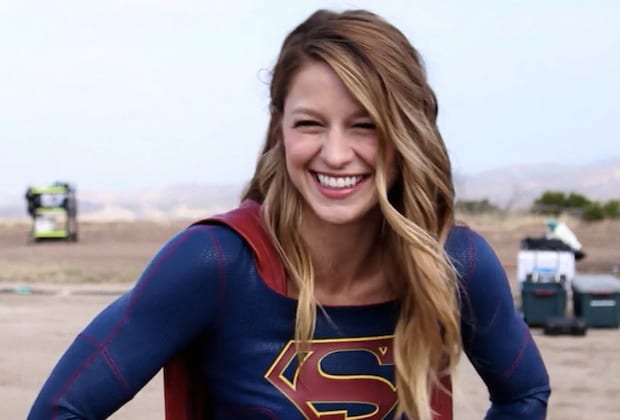
Gretchen: I blame Elizabeth. I didn’t really grow up with superheroes being a fandom I was drawn to. I wouldn’t even call myself a filthy casual, more like an occasional dabbler. My dad really enjoyed classic Superman, so I watched many of the movies (not that I really remember them). I watched the X-men cartoon, Batman the Animated Series, and Superman on Saturday mornings, but they never made into the temple of fandom in my soul.
As an adult, I was really turned off by Nolan’s new take on Batman, so I had zero desire to watch further superhero movies. I never got into any of the other Marvel or DC films (though I did watch, and enjoy, Watchmen, but that’s another story). Neither Grimdark vigilante justice nor conventionally good-looking men and women being violent for no coherent reason compel me. I assumed Supergirl was either much of the same or teen angst driven, like Smallville. My mostly silent Tumblr dash on all things Supergirl persuaded me that it wasn’t worth my time. Some of the harshest critics of it being not just faux-feminism but actively harmful to the feminist message that did make their way onto my dash, seemed to prove my instincts correct. I was wrong about the show, as were the criticisms I’d read. So very wrong.

Like Elizabeth, I sat in stunned silence after watching the pilot. I knew what to expect from the show, given her (long) rants about how good it was, but still. I didn’t think I could be surprised by television anymore, especially not surprised in a good way. Kara’s puppy dog enthusiasm and joyfulness, the focus on female relationships, the strong and healthy bond between Kara and her adoptive sister Alex, James Olsen played by a Greek god a man of color—all these and more made me fall in love. The criticisms I’d believed in had completely missed the point (that’s a subject for another article). Now that I’ve been hooked by it, I feel compelled to drag you all into it with me.
Quick Recap of Episodes 1-5: The Hero’s Rise
Recap might be generous. Summaries would be a better word. If you want a full break down, go to the interwebs and search recaps. Better yet, go watch them; all of S1 is on Netflix so you have no excuse.
Within the seasonal arc, these episodes detail Kara Danvers nee Zor-El’s rise as Supergirl. They encompass her ‘coming out’ (as the show calls it), her first baby steps and stumbles, key lessons about managing her dual identities, forming her team, and becoming comfortable with using her powers while taking down bad guys. They set the tone for what kind of hero she is going to be—an unabashedly optimistic, compassionate, and feminist one—and lays the foundation for key villain and antagonist arcs. They also establish the primary character dynamics amongst the main and secondary cast of protagonists.
Pilot
It opens with the obligatory origin story montage explaining that Kara Zor-El is Clark Kent’s cousin, sent to Earth to protect him but drifted off course into the Phantom Zone, which delayed her arrival to Earth until Clarke Kent was already grown. Dr. Eliza Danvers and her husband Dr. Jeremiah Danvers (who helped Clarke Kent figure out his powers when he was young) adopt her and raise her to be a normal human being alongside their daughter Alex.
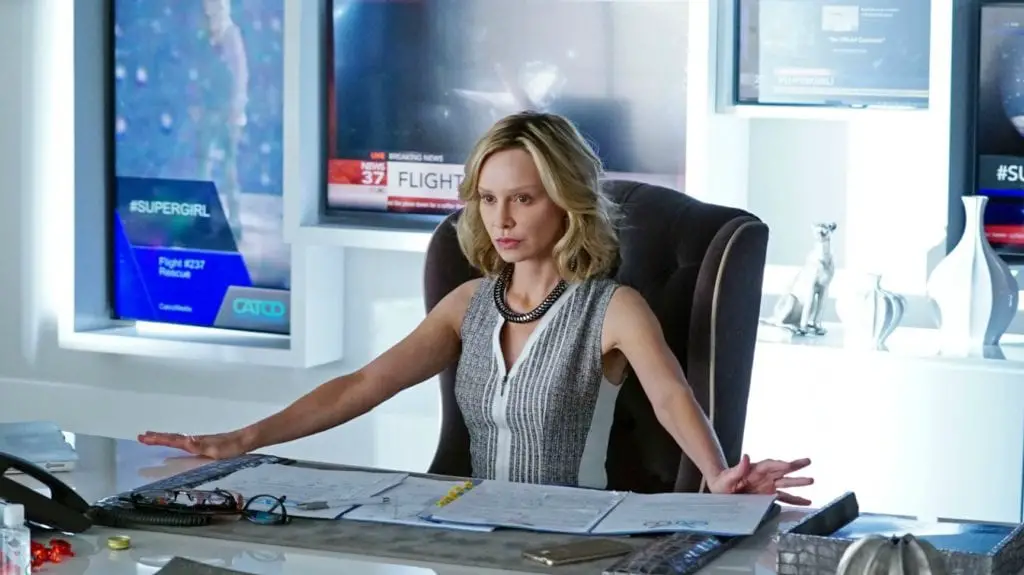
In the present time, Kara Danvers is a personal assistant to powerhouse CEO of CatCo media company Anna Wintour Cat Grant in National City. Also working at Catco are James Olsen (formerly called “Jimmy”, yes the one who took pictures of Superman) and Kara’s best friend Winn Schott. Kara is smitten with James (who wouldn’t be, he’s a Greek god), but Winn is clearly enamored with Kara.
When Alex’s plane has engine trouble, Kara outs herself as a superhero by saving the plane. Cue a costume crafting/baby superhero antics montage with her best friend Winn helping her out. Cat jumps on the chance to brand the new hero Supergirl and claim her as CatCo’s headliner.
Alex reveals she works for the Department of Extranormal Operations (the DEO) and introduces Kara to her boss, curmudgeonly Hank Henshaw. She explains to Kara that when she left the Phantom Zone, her pod pulled a Kryptonian prison called Fort Rozz filled with the galaxy’s most notorious criminals along with it. All those criminals blame her mother Alura, who was a judge on Krypton, for putting them away. They’re now all out to get her in revenge. Kara fails to defeat the first baddie—Vartox—in their first encounter, but with the help of the DEO, she eventually triumphs. James reveals that he knows she is Supergirl. Oh, and the head of the Fort Rozz aliens turns out to be…dun dun dun…Kara’s aunt General Astra Zor-El, twin sister to Kara’s mother Alura!
Best Quote: “What do you think is so bad about “Girl?” Huh? I’m a girl. And your boss, and powerful, and rich, and hot and smart. So if you perceive “Supergirl” as anything less than excellent, isn’t the real problem you?”—Cat Grant, on why Super‘girl’ is not anti-feminist.1
Episode 2, “Stronger Together”
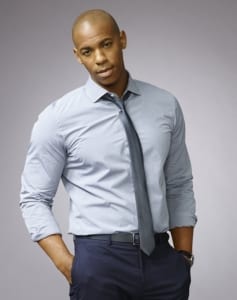
Kara saves a tanker from a fire at the dock, but accidentally causes an oil spill. Cue smart, wealthy owner of Lord Technologies and all around douchebag Maxwell Lord smack talking Supergirl on the media and calling her a menace. Cat wants to scoop the Daily Planet and tasks James with finagling an interview with Supergirl. Obvie Kara is not on board with that, even if it would help her flirt with support James.
The baddie of the week is a Helgrammite (bug dude is all you need to know). Alex gets to kick Kara’s ass in a kryptonite lined training room (because Alex is a highly skilled agent and it’s fun). Cat gives advice to Kara about Supergirl needing to start small (which she follows in a pretty adorable montage) and forms a team around herself with James and Winn because she’s all about being stronger together. They eventually capture the Helgrammite but in the process, Alex is wounded and Astra reveals she has plans for Earth. She also claims she was trying to save Krypton and her sister (Kara’s mother) imprisoned her for it. Hank Henshaw has glowing red eyes and Kara agrees to do the interview with Cat to help James out.
Best Quote: “Part of being your own man is knowing when to accept help.” —Kara Danvers, to James
Episode 3, “Fight or Flight”
Cat interviews Supergirl without recognizing Kara, but Kara accidentally blurts out Superman (Supes from here on out) is her cousin. Kara gets adorkable when James sees her out with Alex and Cat almost has a panic attack about writing an exposé of Supergirl. Hank is mad about Kara slipping the info to Cat about Supes being her cousin (which was on the news), but his grump doesn’t stop Supergirl from helping out at a pile up. But *gasp* a villain shows up and blasts her! His name is Reactron and he’s mad at Supes because his wife died when a nuclear reactor melted down (that he survived) and Supes wasn’t able to save them both when he stopped the meltdown.
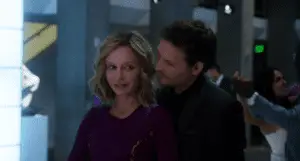
Reactron takes Maxwell Lord prisoner to help fix his suit, which Kara damaged. Kara goes to rescue him, but is attacked by Reactron and Supes saves her because James called him with his signal watch. Cat has a party for her upcoming exposé, flirts with Lord (they clearly have a history and we want to know about it), and leaves. Reactron attacks the party and Kara saves the day by removing the reactor in his suit and wrapping it with lead as per DEO instructions. Kara goes to ask out James, but his ex, Lucy Lane (Lois’ little sister) is there. Kara has a chat with Clark, who cheers her up, and then has sisterly bonding with Alex.
Best Quote: ”I’m a writer. It’s like riding a bike or severe childhood trauma, you never really lose it.”—Cat Grant
Episode 4, “Livewire”2
Stressed out Alex calls Kara because their mother is coming into town for Thanksgiving. Alex thinks Eliza Danvers is mad about her ‘allowing’ Kara to come out as Supergirl; Kara (labrador puppy that she is) believes Alex is overthinking things. Winn gets invited to the Danvers family drama dinner because he has no family to be with. Meanwhile, “shock jock” radio commentator Leslie Willis is on air criticizing Supergirl. Unwilling to let one of her former protégés and employee attack the hero she branded, Cat demotes Leslie to the traffic-coptor while delivering one of the most meta lines of the show thus far.
“People don’t want your brand of negativity anymore, Leslie. They want optimism, hope, positivity.”—Cat Grant, to Leslie Willis
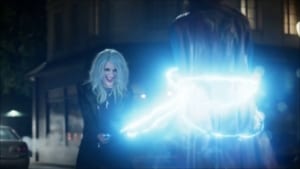
Leslie’s traffic-coptor is struck by lightning and when Kara tries to save Leslie, she is struck by lightening, which is channeled into Leslie. Leslie falls into a coma but wakes up with electricity powers. The Danvers family have an Awkward Family Dinner. There are some flashbacks, the point of which is that the Drs. Danvers are really hard on Alex about Kara using her powers. Oh, and Hank Henshaw came to their house with DEO agents to arrest Kara but Dr. Jeremiah Danvers agreed to work with them instead.
Leslie, now calling herself Livewire, attacks Cat in her office but escapes. Kara and Cat talk about mothers and mentors. Cat helps Supergirl trap Livewire and Cat learns a valuable lesson about ‘raising the discourse’ in her media outlets. She’s done being petty, she wants to help people, not tear them down.
Best Quote: “Mothers, daughters, hard…not that I’m not grateful, everything I am, everything I have is because of her constant…’pushing’ let’s call it. She was never satisfied with me so I’ve never been satisfied with myself.”—Cat Grant, on her terrible human of a mother
Episode 5, “How Does She Do It?”
Non-DEO drones are chasing Supergirl! Oh noes! Kara learns Cat has been awarded the Siegel prize for journalism. Cat says she won’t go because her babysitter broke her leg and she needs someone to watch her special, shy, smart son Carter. Kara (of course) volunteers. Lucy and James get back together (see note for the last episode) and Kara stops a bombed building from collapsing. Alex figures out the drones are from Lord Technologies. Kara is late picking up Carter, but gets to have a classic superhero-changes-costume-in-the-bushes scene. Carter actually is special, shy, and smart (and not a spoiled brat), but he soon opens up to Kara when they start talking Supergirl and being nerds (also Cat is a great mom). Alex confronts Lord. He’s unconcerned about the drones (despite him saying otherwise). He also Distrusts the Government because his parents died due to government oversight. He tries to flirt with Alex but there’s a bomb in one of the labs! Kara leaves Carter with Winn to go rescue Alex and Lord.
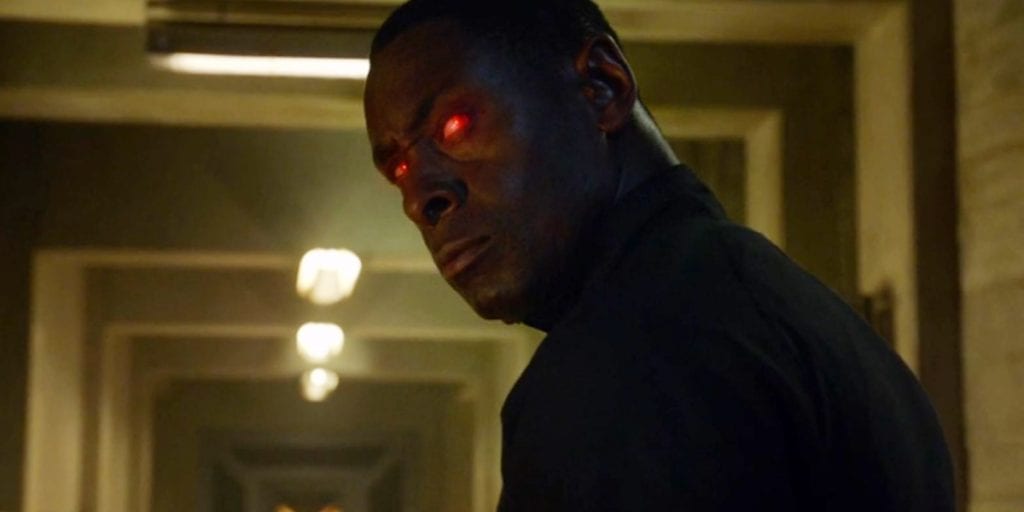 While getting rid of the bomb, Kara is knocked out and as she’s waking up, she sees Hank’s glowing red eyes. Hank tells her they figured out who is behind the bombings, a disgruntled former employee of Lord Technologies named Ethan Knox. Kara has an awkward chat with Lucy about James and then encourages James to fight for his relationship with her. Lucy decides it isn’t going to work and plans to fly back to Metropolis. Kara heads to the train Maxwell Lord is unveiling to stop the bomber, Carter goes alone to the train to meet Supergirl, and a second bomb is found at the airport.
While getting rid of the bomb, Kara is knocked out and as she’s waking up, she sees Hank’s glowing red eyes. Hank tells her they figured out who is behind the bombings, a disgruntled former employee of Lord Technologies named Ethan Knox. Kara has an awkward chat with Lucy about James and then encourages James to fight for his relationship with her. Lucy decides it isn’t going to work and plans to fly back to Metropolis. Kara heads to the train Maxwell Lord is unveiling to stop the bomber, Carter goes alone to the train to meet Supergirl, and a second bomb is found at the airport.
James, Alex, and Hank head to the airport to stop the bomb, which Hank pries open with bare hands and defuses while his eyes glow red. No one is around to see his deeds, so he tells Alex it was a fake bomb to cover it up. Kara tries to de-escalate Ethan on the train, but he refuses to back down. He has a sick little girl and believes this is the only way to help her. Kara saves the train, but can’t save Ethan because he chooses to end his life. We get good mom Cat (to Carter) and excellent mentor Cat (to Kara) when she returns from the award ceremony. Supergirl confronts Lord and confirms he set the whole thing up to test her abilities and limits. Kara vows to watch him. Lord smirks smarmily (and Gretchen wants to punch him, not for the first time, nor the last).
Best Quote: “Just because I look a certain way on the outside, everyone assumes it matches the way I feel on the inside.”—Lucy Lane
Characters
We have four categories of characters on Supergirl: The Fantastic 4 (primary protagonists), The Supporting Heroes (secondary protagonists), The Sympathetic Villains, and The Big Bads3. The latter two categories include recurring villains and baddies, rather than the ‘monster of the week’ variety, of which there are many. You’ll get one from each category every week because we’re stingy like that building up your anticipation You won’t get a Big Bad this week, though, since there are only three and this week’s piece is long enough (#sorrynotsorry).
The Fantastic 4: Kara Danvers
 Kara Danvers is a young, educated, feminist minded woman with a heart of gold and a fundamental faith in the goodness of humanity. She embodies the original spirit of Superman in every possible way: she is not a hero because she has superpowers, she is a hero because she truly believes that it is her mission in life to protect earth from anyone or anything who would do them harm. She is kind, thoughtful, and brave. She’s adorably fumbly (especially when around James), honest, and real.
Kara Danvers is a young, educated, feminist minded woman with a heart of gold and a fundamental faith in the goodness of humanity. She embodies the original spirit of Superman in every possible way: she is not a hero because she has superpowers, she is a hero because she truly believes that it is her mission in life to protect earth from anyone or anything who would do them harm. She is kind, thoughtful, and brave. She’s adorably fumbly (especially when around James), honest, and real.
Given how Grimdark and revenge have infected our screens, her commitment to compassion, empathy, and inspiring others to be their best selves is shockingly refreshing and novel. Everyone gets a chance to redeem themselves with Kara, to choose light and life. She always begins with de-escalation, giving each villain several chances to change their course before wiping the floor with them. When she cannot convince someone to change their ways, she is visibly bothered by it, never gloating about her victories or dehumanizing her opponents. Even when she falls from heroism, she never kills anyone. Kara Zor-El has a code and she’s sticking to it, through rain or sleet or red kryptonite.
Speaking of falling and red kryptonite, Kara Danvers’ struggle with voicing and acting on her bad thoughts (Episode 16) is remarkably familiar. But even her fall does not keep her down for long. Like the villains she battles, Kara herself gets a second chance to restore humanity’s faith in her as a hero. But not before she has a moving sequence where she sobs about how awful it was to be consumed by her bad thoughts.
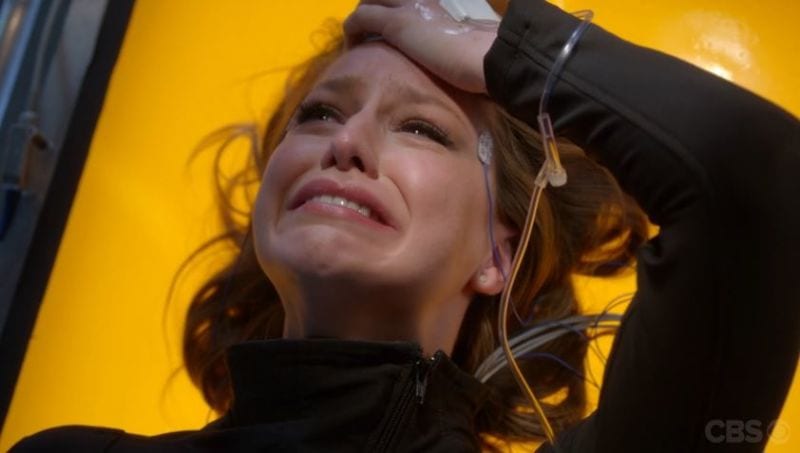
Ultimately, her desire to save others from suffering the same pain she experiences by losing her family and planet as a child, and her refusal to believe that anyone is beyond her aid, is what makes her a hero. Like some of our other favorite characters (Sansa Stark, Steven Universe, Laura Hollis, Tara Maclay), Kara overcomes darkness with light, suffering with joy, and revenge with compassion. She uses her position of privilege to help pull up those who were not so lucky. Her optimism and hope do not negate the depth and poignancy of her own struggles at all, though. Instead, her relentless pursuit of empathy and kindness proves that she is strong in the real way and willing to get back up when she falls down.
She chooses strong family bonds, positive female friendships, the mentorship of an older and wiser woman, and a team to help her. She’s not a lone-wolf vigilante stuck brooding on her pain and heedless of the destructiveness of her so-called heroism. She’s neither a gritty anti-hero nor a fallen demigod. Then again, don’t we have enough of those anyway?
The show always makes sure to humanize Kara, rather than sticking her up on a lofty pedestal of ideals that she can’t possibly maintain. This humanization makes her seem that much more real, and counter-intuitively, that much more heroic. Characters require moments of weakness and flaws to be believable, and Kara feels very much like a real, complete person. We love her for what she is, and who she is, and that is precisely the kind of hero we need.
The Supporting Heroes: Winn Schott Jr.
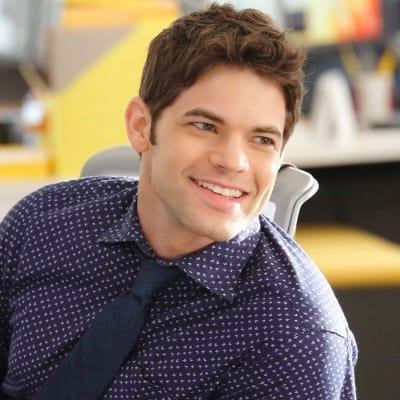 Kara’s best friend made both of us squeamish when he first graced our screens. His conclusion that Kara must be a lesbian because she wasn’t into him (UGH) is cringeworthy. Stick with him, though. He gets better.
Kara’s best friend made both of us squeamish when he first graced our screens. His conclusion that Kara must be a lesbian because she wasn’t into him (UGH) is cringeworthy. Stick with him, though. He gets better.
Winn is everything a superhero’s best friend ought to be. Understated, nerdy, a bit awkward, and invested in Kara as a person as well as a superhero. Winn is Kara’s biggest cheerleader. I mean, come on, the guy designs her costume and snags the empty office down the hall for her, James, and himself to use as their own small-scale batcave. For being an IT guy, he avoids pretty much all of the worst tropes about technology oriented white males. He’s really smart, but you’d never hear him brag about it. Unless it’s with the Flash in the crossover episode (Episode 18) and then it’s flat out adorable. He’s 50% floofy hair, 50% nerd, and 100% heart. If you are a fan of characters like Parks and Rec’s Ben Wyatt, you will like Winn. They even have the same wardrobe.
Though the Pilot might lead you to expect an entitled friendzone angst arc, the writers handle his unrequited feelings for Kara remarkably well. When she rebuffs his kiss and he admits how he feels about her, he accepts her lack of reciprocation without pressing her to return his feelings. Although he doesn’t talk to her for an episode because he needs space and time, they eventually restore their friendship and he finds another love interest. He eventually tells Kara she needs to go get her some James. Like. What?
His backstory episode (Episode 10) moved us to tears. In true Supergirl fashion, they explored the tragedy of broken parent-child relationships, narcissism, emotional abuse, and mental illness with deftness and clarity. What Winn says about his fears of becoming his father applies very well to any of the ‘scary’ mental illnesses.
“His genes are like ticking time bombs inside of me just waiting to go off and hurt people.”—Winn Schott Jr., on his father “Toyman”
Simultaneously, the episode condemns the idea that mental illness is to blame for violent acts. Winn’s father is obviously mentally ill, but the narrative makes a point of separating that from his actions. Winn’s choice to control and manage his illness, and form a support network to help him, distinguishes him from his father, not their genes. More than that, given a chance to go full Green Goblin/Hobgoblin, they veer left. Winn redeems himself from walking in his father’s footsteps by choosing a better way even in the face of romantic rejection. Conclusion? Winn won our love.
The Sympathetic Villains: Astra Zor-El
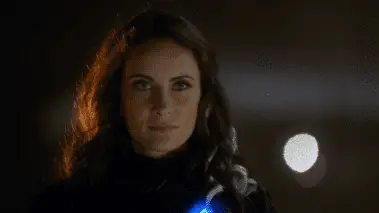 The twin sister to Alura Zor-El, Kara’s mother, Astra defies easy villain characterization. When you scratch the surface, she’s a good person pushed to extremes to protect the home and planet she loved. In the past, the greedy harvesting of Krypton’s core put it on the brink of ecological disaster, so Astra and her husband Non sought to save the planet by whatever means necessary. They were willing to do questionable things in the name of what they believed to be right, including terrorism and murder. Now they plan to ‘save’ the Earth the same way.
The twin sister to Alura Zor-El, Kara’s mother, Astra defies easy villain characterization. When you scratch the surface, she’s a good person pushed to extremes to protect the home and planet she loved. In the past, the greedy harvesting of Krypton’s core put it on the brink of ecological disaster, so Astra and her husband Non sought to save the planet by whatever means necessary. They were willing to do questionable things in the name of what they believed to be right, including terrorism and murder. Now they plan to ‘save’ the Earth the same way.
One can’t talk about her without her twin sister, both of whom serve as foils for Kara’s exploration of what it means to be a hero. They’re two sides of the same coin. Alura believes people are basically good, while Astra believes that they are weak and need guidance. Astra chooses law and justice, Alura chooses chaos and extremism. Alura believes humanity worthy of protection, Astra that they’re an infestation on Earth that needs to be stopped before they destroy the planet. In the final analysis, the sisters are more alike than not, both willing to do everything for their values. Only their values differ. Alura was willing to punish people with harsh justice to save her planet from chaos; Astra was willing to let people die to help save her planet from ecological disaster.
Astra’s not as different from Kara as she first appears, either. She shows mercy to Kara at every opportunity. Though committed to her cause, she refuses to permanently harm Kara even when she rejects Astra’s offer to join her cause. When Non puts Kara under the influence of a mind-altering alien being (a “Black Mercy”) to get her out of their way, Astra berates him.
“There is always another way!” —Alura Zor-El, regarding Non’s use of the Black Mercy
Sound familiar? Kara says that. More than once. It’s kind of her thing.
 Tragically, Astra is killed in battle, so we don’t know how a deeper relationship with her niece would have played out. Kara believes she had almost succeeded in bringing Astra into the light, and we can’t deny the trajectory is there. Especially not when you compare her softening attitude to Kara with her husband Non’s willingness to use the Black Mercy to get Kara out of the way. Far from irredeemable, she’s on the road to redemption but her arc is cut short before it finishes.
Tragically, Astra is killed in battle, so we don’t know how a deeper relationship with her niece would have played out. Kara believes she had almost succeeded in bringing Astra into the light, and we can’t deny the trajectory is there. Especially not when you compare her softening attitude to Kara with her husband Non’s willingness to use the Black Mercy to get Kara out of the way. Far from irredeemable, she’s on the road to redemption but her arc is cut short before it finishes.
It is important to note, however, that Astra doesn’t feel like she was Fridged. The circumstances surrounding her death were a believable consequence to Astra’s actions, and that is far rarer in television shows than it should be. Astra’s death hurts, but it’s the good kind of hurt; the kind that serves the characters, not the plot. While it would have been lovely to have Astra become a redeemed villain, we won’t fault the show for not choosing to take that path. The story as written is well-crafted and poignant, and to avoid Astra’s death would have required some seriously powerful Plot Armor.
The Big Bads
Come back next week for Livewire!
Theme: What Does It Mean To Be A Hero?
Supergirl is a very dialogue-heavy show, and it spends a large chunk of that dialogue driving home the point that it’s not having power that makes you a hero, it’s how you choose to use the power you’re given. This theme is not limited to superpowers, either; the human heroes also consistently wield their power for the forces of good, whether it’s Alex’s secret agent training, James’ inherent bravery and investigative journalism skills, or Cat Grant’s incredible media empire and cultural influence that comes with being “The Queen of All Media.” Supergirl takes that classic Spiderman quote, “with great power comes great responsibility,” and cranks it up to 11.
One of the greatest things about Kara is that she has the heart of a hero, even when she isn’t using the powers of one. Within the first ten minutes of the pilot, Kara tells Alex that “I went to work for Ms. Grant because I thought working in a media company run by a powerful woman who actually shapes the way people think would be the way that I could make a difference.” It’s clear that Kara Danvers is an educated young woman who is determined to use her privilege and power to lift people up, even when we are only using the phrase ‘lift up’ metaphorically.
 This is an attitude shared by all of the heroes, whether they are saving people from burning buildings or simply choosing to put out positivity into the media world even when negativity sells better. (The meta-ness of this theme is right up our alley.) Across the first season, Supergirl makes a point of showing all different kinds of heroism, driving home the point that anyone can be a hero with the all the subtlety of a roundhouse kick to the head. This focus on the essence of heroism, rather than the literal practice of it, is in service to the greater theme of season one: superpowers can win the fight, but hope and optimism will save the day. In Supergirl, violence is not always the answer, and is quite often presented as the last resort when diplomacy and empathy have failed.
This is an attitude shared by all of the heroes, whether they are saving people from burning buildings or simply choosing to put out positivity into the media world even when negativity sells better. (The meta-ness of this theme is right up our alley.) Across the first season, Supergirl makes a point of showing all different kinds of heroism, driving home the point that anyone can be a hero with the all the subtlety of a roundhouse kick to the head. This focus on the essence of heroism, rather than the literal practice of it, is in service to the greater theme of season one: superpowers can win the fight, but hope and optimism will save the day. In Supergirl, violence is not always the answer, and is quite often presented as the last resort when diplomacy and empathy have failed.
What makes a hero, then, is their choices, not their innate powers, skill, talents, or education. You can have all those things and still not to be a hero if you use your privilege to put other people down (see Cat Grant’s mother). No one can force you to be a hero any more than they can force you into redemption/salvation. Everyone has to make their own choices about who they want to be, even villains. When Kara asks why Superman never told her to become a hero like him, James tells her, “Because he wanted you to choose it for yourself. The same way he did. That’s what makes a hero, Kara.” Heroes aren’t born, they’re made by the choices we make. Choosing compassion, hope, and helping people, that’s what makes a hero.
Spotlight On: Cinematography And Visual Presentation
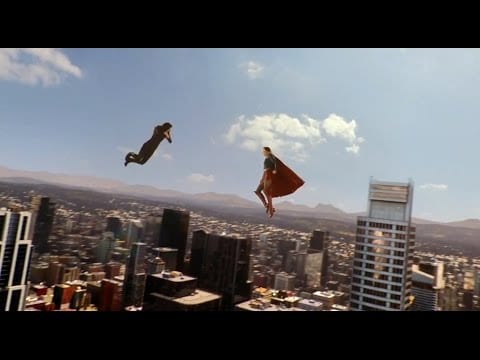
Don’t ask us how they do it, but the production staff managed to capture the essence of comic book framing and bring it to the television screen. Flying sequences appear to be lifted directly out of the pages of a comic book. Kara’s posture—classic Supes with arms outstretched while flying and the bent right knee while floating—the saturated color palette, the composition of individual shots and the cuts from one shot to the next could be translated frames and panels with little changing. Fight scene choreography mimics what you’d expect from the still frames on paper, which has the side effect of making this show extremely easy to screencap, since the shots are composed with both moving and still images in mind.
Alongside the incredible shot composition is the color palette, as mentioned above. This show is vibrant and saturated, and relies heavily on the colors blue and red in both background objects and character costuming. Characters are noticeably dressed in contrasting red and blue, especially in sequences that are light on action, to keep the visuals of the show interesting. In addition to being very deliberately organized to capture that comic book frame feel, the objects in the background are deliberately colored; we can’t speak to how much post-production color correction was done on the show, or if all these color choices were done in the original shots, but either way; they look fantastic.
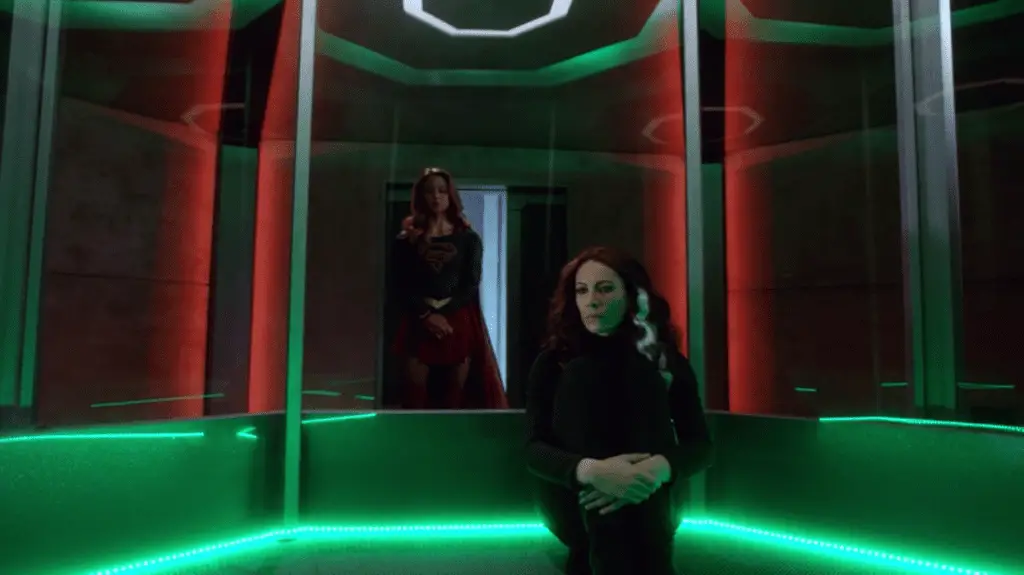 The lighting also is deliberately staged to create color contrast; in shots where you have two characters talking with the camera focusing on either one or the other, the background lighting behind each character will usually be contrasting colors. Orange and blue is the usual go-to contrast for television and film, because it’s the heaviest contrast and people=orange, sky=blue. But Supergirl makes use, very frequently we might add, of red/green and yellow/purple contrast. It’s a delight to watch, because it gives the show a unique look, and you can very clearly see what the hell is going on in any given shot, even when the characters are being shown at night or in a dark room. You will never feel the need to turn up the brightness on your television or laptop while watching Supergirl, a low bar to set that most of television just limbos right under lately.
The lighting also is deliberately staged to create color contrast; in shots where you have two characters talking with the camera focusing on either one or the other, the background lighting behind each character will usually be contrasting colors. Orange and blue is the usual go-to contrast for television and film, because it’s the heaviest contrast and people=orange, sky=blue. But Supergirl makes use, very frequently we might add, of red/green and yellow/purple contrast. It’s a delight to watch, because it gives the show a unique look, and you can very clearly see what the hell is going on in any given shot, even when the characters are being shown at night or in a dark room. You will never feel the need to turn up the brightness on your television or laptop while watching Supergirl, a low bar to set that most of television just limbos right under lately.
These vibrant color and lighting help showcase the solid CGI enhancements used in the show. The pilot is probably the most CGI intensive episode of the series, but it’s not winning by a very large margin. The amount of CGI used in the show is actually quite staggering, especially considering how good it all looks. The plane sequence in the pilot, and the first daylight flying sequence in the beginning of episode 2, set the standard you can expect from the CGI enhancements of the show. It’s not movie quality, but it’s definitely some of the best you’ll see used in television. The CGI is also nicely complimented by a collection of practical visual effects, whether they be costuming, makeup, traditional stunts, or even old-timey theater tricks like forced perspective.
All of this comes together with the script to create a show that not only has new things to say, it has new things to show you. We’ve talked about how much we’d like to see an adult show with the vibrancy and color palette of Steven Universe and Supergirl comes very, very close. Low contrast, blurry, greyed-out cinematography is quite popular on television right now, and Supergirl could not possibly be more opposing to that; it stands out like a red pantsuit at a stock broker’s firm (in more ways than one.) It is clear that the visual team on this show was as determined as the writing crew to bring its audience something new and different, and we very much appreciate the effort.
Extra Tidbits
- If you pay attention to the background in the DEO scenes, you will notice that the extras are about 50/50 split male and female, and fairly racially diverse. The DEO also has one of the first truly unisex uniforms I’ve ever seen: black pants, tailored black polo. On a Doylist level, A+ attention to detail from the production staff, this is intentional. On a Watsonian level, it says a lot about the man in charge. Flashbacks to the DEO of decades prior shows all-male strike teams and operatives, so this was not an accident; the show knows exactly what it’s doing, and it wants you to notice.
- Within seconds of Alex and Kara interacting, the strength their sisterly relationship shines through. Kara’s healthy relationship with her adoptive parents and Alex and the stability of their home live comes up again and again throughout the series.
- In the first episode, Alex opens up about her feelings of insecurity growing up with Kara as her sister. She admits her jealousy and desire to keep Kara’s powers in the closet because it made her feel superior. Then they talk about it, Alex apologizes, Kara forgives her, and they move on. Not only is their sibling love #relationshipgoals but the ability of the story to deal with heavy emotional things and resolve it without dragging it out into angst impresses us both. The writers consistently handle the inter-personal communication and drama this way. Did we mention how this is like no other show on television right now?
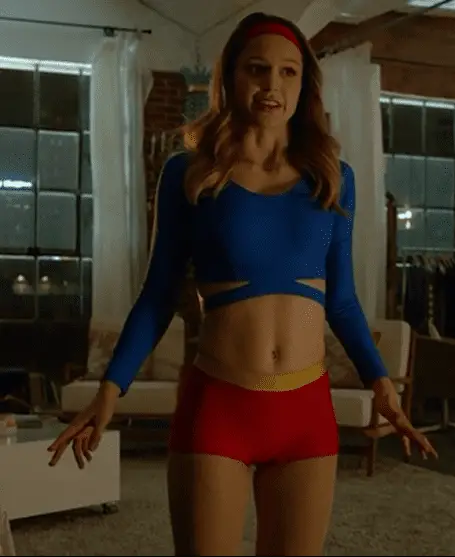 In the Pilot, Winn bases his first costume design off of actual comic book designs. It looks hilariously like 80s Superwoman and Supergirl. It’s a nerdy reference, not a demonstration of his sexism. Also, Kara’s ‘yikes face’ in that costume should tell you everything you need to know about how the writers feel about this kind of costume.
In the Pilot, Winn bases his first costume design off of actual comic book designs. It looks hilariously like 80s Superwoman and Supergirl. It’s a nerdy reference, not a demonstration of his sexism. Also, Kara’s ‘yikes face’ in that costume should tell you everything you need to know about how the writers feel about this kind of costume.- Recognize the actor playing Dr. Jeremiah Danvers? He played Clark Kent in The Adventures of Lois and Clark.
- When two women fight, they actually fight. No chick fights here. The punch-out brawl between Astra and Kara in episode 2 truly does feel like two Kryptonians fighting each other, with both of them getting thrown through cement walls and bending steel when they smash into it. While Alex can’t throw people into the stratosphere, she can give and take a punch with the best of them. The female fighters in this show look and feel appropriately powerful, whether they be human or alien.
- The actor who plays Maxwell Lord plays Carlisle Cullen (Edward’s ‘dad’) in Twilight.
- The show is really meta about potential criticisms, often bringing them into the show as part of the dialogue, like Leslie Willis mocking Supergirl’s lack of sexuality or Kara pointing out that ‘girl’ might be anti-feminist. They’re heavy handed about it, but we both like that. They don’t beat around the bush and are willing to face their detractors head on and even bring that into the show itself as a way of coping with haters. It’s impressive, really, and quite necessary considering the current environment of television. While those of us well-versed in feminist theory don’t need our hand held, the show is not trying to hold *our* hand through it; it’s for everyone else. For us, the show has plenty of other more subtle goodies to chew on.
- Kara fiddles with her glasses and snorts when she’s nervous, adorable.
- We didn’t like the whole ‘friendzone’ conversation in episode 5. Especially with two women, because this typically isn’t a conversation two women have. ‘Friendzone’ seems to be the lexicon of male entitlement, not female disappointment. It’s the only time in the first 5 episodes that the dialogue has been less than stellar, though. Consider this more of a nitpick rather than a genuine critique.
- Parallelism in story lines in episodes is done really well, but not so overt as to make the audience feel stupid.
Stay tuned for next week where we’ll tackle the next phase of Kara’s superhero journey, “Flying High”! Also, feminism. Much feminism. Until then,
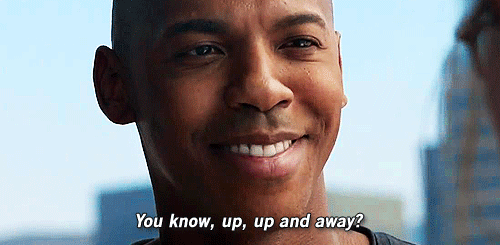
Images of Supergirl courtesy of CBS and the CW
1. If you’re at all annoyed about the name ‘Supergirl’ (as some people on the internet are), the Doylist explanation for using this superhero name is because Superwoman is a completely different character in the DC universe with a completely different backstory. ‘Supergirl’ is just the name of the character in the DC universe. To make a show about Kara Danver, it has to be ‘Supergirl.’ Superwoman is someone else.↩
2. This was initially meant to air the week of Thanksgiving as Episode 5 of the series. However, due to the Paris Attacks and the fact that the original Episode 4 (“How Does She Do it?”) had Kara protecting National City from a bomber, the episodes were swapped out of respect for the victims. Due to this, there are minor glitches in continuity, like Lucy and James’ renewed relationship. They get back together in what is now Episode 5 (originally Episode 4), and he goes with her family for Thanksgiving in what is now Episode 4. It can feel slightly jarring, but knowing the intended airing order alleviates the mild disorientation. The other glitch is Alex’s trust of Henshaw in the now Episode 5, which feels off since she learns about Hank Henshaw being involved with her father’s disappearance in what is now Episode 4.↩
3. This category title has been changed from “The Irredeemable Big Bads” to “The Big Bads”, as the authors feel that this best reflects Kara’s own perception that everyone deserves a second (and third and fourth) chance.↩


